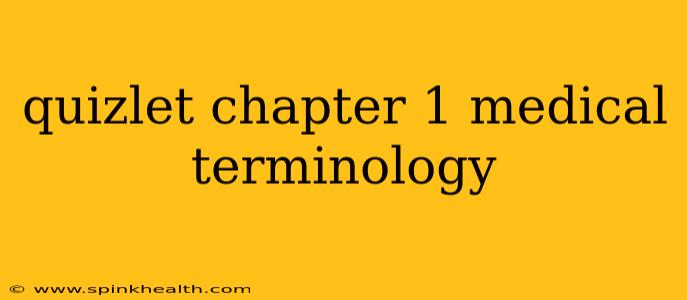Conquering Chapter 1 of Medical Terminology: A Quizlet Quest
Let's be honest, medical terminology can feel like climbing Mount Everest in flip-flops. Those prefixes, suffixes, and root words—a seemingly endless labyrinth of Greek and Latin origins. But fear not, aspiring medical professionals! This journey through Chapter 1 of your medical terminology textbook can be conquered, and Quizlet is your trusty Sherpa.
I've been there, staring blankly at a page filled with unfamiliar terms, the frustration mounting with each passing minute. But with the right approach and a dash of determination, you can transform that feeling of overwhelm into a sense of accomplishment. This guide will help you navigate the challenges of Chapter 1 and use Quizlet to its full potential. Think of this as your personal training manual for mastering medical terminology.
What are the common prefixes, suffixes, and root words covered in Chapter 1?
This is the cornerstone of your medical terminology journey. Chapter 1 usually lays the foundation by introducing core building blocks: common prefixes (like a- meaning "without," hyper- meaning "excessive," or brady- meaning "slow"), suffixes (such as -itis denoting "inflammation," -ectomy signifying "surgical removal," or -algia indicating "pain"), and root words (like cardi- for "heart," derm- for "skin," or gastr- for "stomach"). The specific words will vary slightly depending on the textbook, but this is the general territory. The key here is not just memorization, but understanding the meaning of each component. Quizlet excels at this. Create sets focusing on each category separately; then, combine them for a more comprehensive review.
How can I use Quizlet effectively to study Chapter 1's medical terms?
Quizlet offers a variety of learning modes, each with its own strengths. Don't just stick to flashcards! Experiment with:
- Flashcards: The classic approach. Use images if your textbook provides them.
- Learn Mode: Quizlet tests you on the terms in a sequence, providing feedback and repetition.
- Write Mode: Forces active recall by requiring you to write the definition from memory. This is crucial for deeper understanding.
- Test Mode: Simulates an exam environment, helping you assess your progress.
- Match Mode: A fun way to test your knowledge by pairing terms with their definitions.
- Gravity Mode: A gamified approach that rewards correct answers and penalizes incorrect ones, making learning more engaging.
What are some tips for using Quizlet beyond just memorizing definitions?
Simple memorization is rarely effective long-term. Here's where Quizlet shines beyond rote learning:
- Create your own sets: Tailor the content to precisely match your textbook's chapter, focusing on the terms and definitions that are giving you the most trouble.
- Use images and mnemonics: Visual aids and memory tricks (like creating funny sentences or acronyms) dramatically improve retention. If your textbook doesn't have images, create your own simple drawings.
- Study in short, focused sessions: Avoid marathon study sessions. Shorter, more frequent sessions are more effective for long-term retention. Use the spaced repetition feature in Quizlet to your advantage.
- Collaborate with classmates: Share sets, compete in learning games, and quiz each other to reinforce learning and make the process more fun.
Are there specific Quizlet features that are particularly helpful for learning medical terminology?
Absolutely! Leverage Quizlet's:
- Spaced Repetition System (SRS): Quizlet's algorithm strategically schedules reviews based on your performance, ensuring you focus on the terms you find most challenging.
- Customizable Flashcards: Add images, audio pronunciations, and even links to relevant resources to enhance your learning experience.
- Multiple Choice and True/False Options: Provides diverse testing modes to check your understanding in different formats.
By strategically using Quizlet and focusing on understanding the components of each medical term, you'll transform that intimidating Chapter 1 into a stepping stone to mastering the language of medicine. Remember, consistency and smart study habits are key to success! So, grab your virtual stethoscope, fire up Quizlet, and let's conquer Chapter 1 together!

